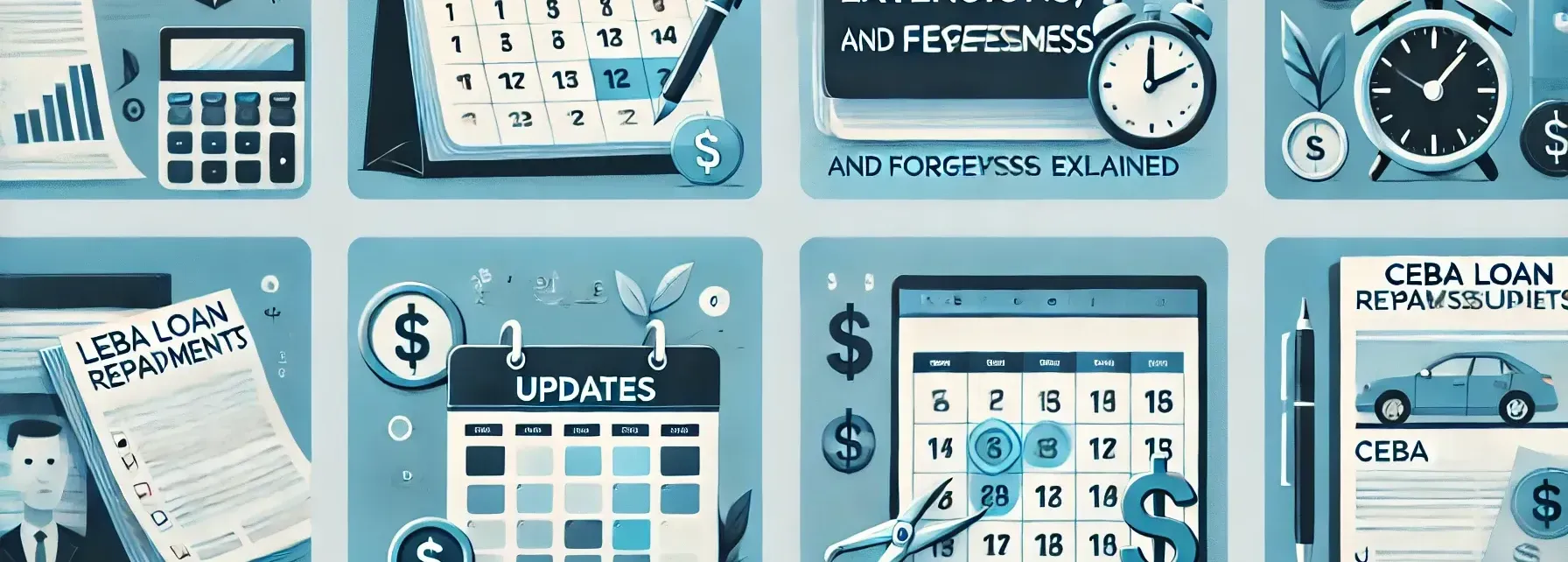CEBA Loan Repayment Updates: Deadlines, Extensions, and Forgiveness Explained
When the pandemic hit Canada in early 2020, businesses faced significant challenges, prompting the federal government to introduce the Canada Emergency Business Account (CEBA) in April 2020. CEBA offered interest-free loans of up to $60,000 to help businesses and not-for-profits navigate these difficulties. Though the program stopped issuing new loans in June 2021, it provided partial loan forgiveness for businesses that met certain repayment deadlines. In September 2023, the government extended the repayment deadline.
Here’s what you need to know about CEBA loan forgiveness and the upcoming deadlines.

When Is My CEBA Loan Repayment Deadline?
To take advantage of partial loan forgiveness, you must repay your CEBA loan by specific dates:
- March 28, 2024: If you apply to refinance your loan by January 18, 2024, this is your deadline to repay the loan and qualify for partial forgiveness.
- December 31, 2026: Final due date for repaying any outstanding balance, including 5% annual interest.
Am I Eligible for CEBA Loan Forgiveness?
If your loan is in good standing and meets eligibility criteria, you should qualify for partial loan forgiveness. Your lender should have notified you of eligibility in late 2022, and the repayment deadline was extended from December 31, 2023, to January 18, 2024.
How Much Is Partial Loan Forgiveness?
Loan forgiveness depends on the size of your loan:
- Loans of $40,000 or less: Eligible for up to 25% forgiveness.
- For a $40,000 loan, this means $10,000 can be forgiven.
- Loans between $40,000 and $60,000: Eligible for 25% forgiveness on the first $40,000 and 50% forgiveness on the remaining loan amount.
- For a $60,000 loan, up to $20,000 can be forgiven, leaving a $40,000 repayment.
What Are the CEBA Loan Repayment Terms?
CEBA loans were interest-free initially, but any outstanding balance after January 18, 2024, will begin accruing 5% interest annually. Payments will then be required monthly, with the full balance due by December 31, 2026.
How Do I Repay My CEBA Loan?
You’ll repay your CEBA loan through the financial institution that issued it. Contact your lender to arrange repayment and ensure you meet the deadlines.
What If I Can’t Repay My CEBA Loan?
If your business hasn’t fully recovered and you’re unable to repay the loan, contact your financial institution immediately. Defaulting can
lead to penalties such as:
- Lower credit scores
- Fees and penalties
- Potential seizure of collateral if applicable
Your lender may offer refinancing options, such as securing a new loan with a longer repayment term, or you may consider selling assets to raise funds.
Will CEBA Loan Forgiveness Impact My Taxes?
Yes, any forgiven portion of your CEBA loan is taxable. For example, if $10,000 is forgiven, you must declare that amount as income on your tax return.
Steps to Take if You Have a CEBA Loan
- Check your loan status: Contact your financial institution or log in to your online banking portal to verify your repayment status.
- Prepare for repayment: Be aware of the deadlines and contact your lender if you need to explore other repayment options.
- Understand the tax implications: Plan to include any forgiven portion of the loan in your taxable income for the year.
If you need more information, visit the CRA website or speak with a financial advisor to stay ahead of your repayment obligations.
Key Takeaways:
- March 28, 2024: Deadline to repay CEBA loans in full (minus the forgiven portion) for those applying for partial loan forgiveness.
- CEBA loan forgiveness is taxable and must be reported when filing your taxes.
- After January 18, 2024, any outstanding CEBA loans will accrue 5% interest.











